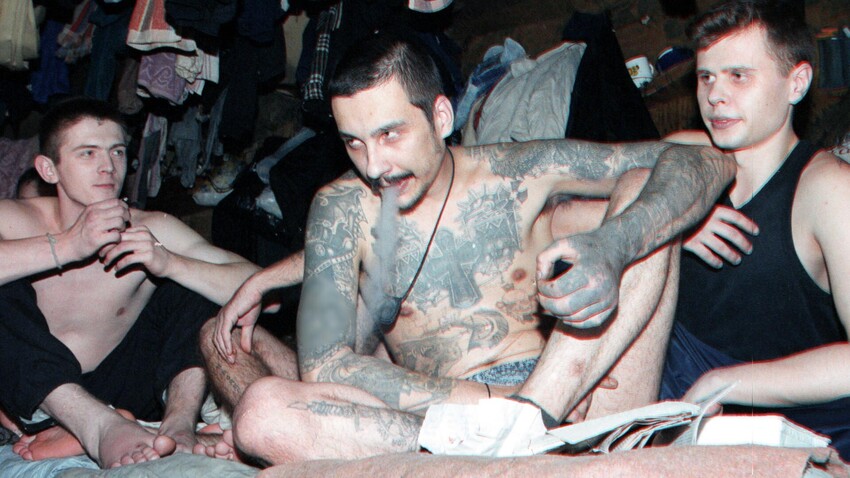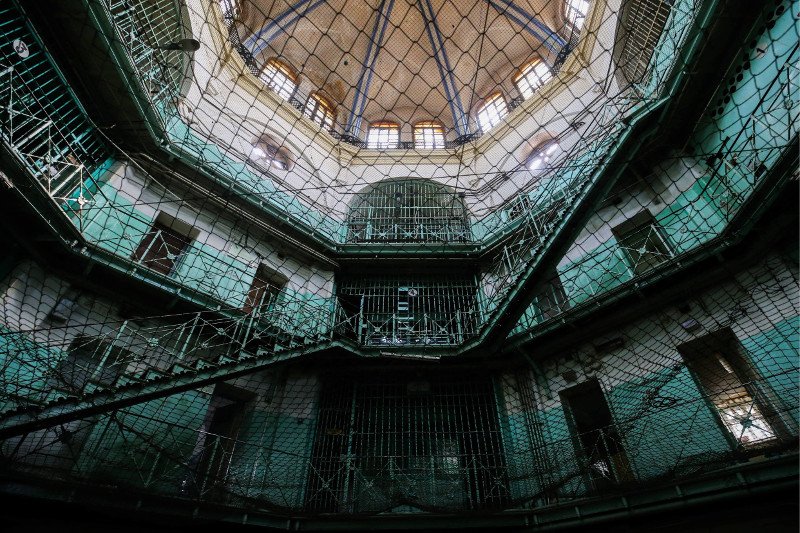
This is a screenshot from the CC-licensed doco mentioned in the original post
This post is the last in a series of 3 posts (first here, second here) about the monstrosities of the Russian prison system. As mentioned, I didn’t find the worst thing to be the terrible living conditions or even the tortures invented by the administration. The worst thing is the prison caste system.
In English-speaking countries some concepts from the brutalities of prison life have permeated the culture. Examples include: situational homosexuality (ie. heterosexually-identified men having sex with each other in prison because there are no women), situational gay rape, being someone’s “bitch” and so on. This is often appallingly treated as a matter of fact, or even a joke (‘this is your asshole before prison’). I hope this account will provide a sobering antidote to such cavalier attitudes. It’s probable that things in Russia are much worse than most countries because of the culture, criminal subcultures, the prevalence of brutal crimes and so on — but I don’t know for sure.
The lowest caste in Russian prisons are called Downcasts. Here’s the Russian Wikipedia article on this if you want more details. The current English language equivalent is the article on prison rape which does not cover the same things — however this link will take you to a Google autotranslation of the above wiki page which is better than nothing.

A person is usually made downcast for doing something considered terrible or beyond the pale in the prison culture. Below are some (non-exhaustive) reasons:
- Dobbing in other prisoners
- Being excessively cruel to other prisoners. Especially joining with the administration against prisoners. Of that, especially, participating in a cell press as one of the victimisers (see last post).
- Being unable to pay a gambling debt
- Being [suspected of] being gay
- Other forms of [perceived] gender “deviation”: being seen as effeminate, being known to participate in activities “degrading” to men (eg. cunilingus).
- Being convicted of child molestation and similar crimes
- Being a member of law enforcement before conviction
- Being perceived as weak (eg. victims of rape, many prisoners transferred from juvenile detention)
- As a voluntary act, for those who really need the money and have no choice but to become prostitutes for hire for other prisoners
A person can be made downcast simply by the decree of a high-ranking or respected prisoner. However, often the ritual component includes doing something degrading. The picture at the top of the post is a Downcast who had “slave” forcibly tattooed on his cheek. The most common things are gang-rape, gang-bashing, choking with a towel, oral rape (after breaking some teeth to avoid biting), emptying a chamber pot over the prisoner and so on. Or a combination from the above.
One of the most horrifying yet fascinating aspects is that to be Downcast is seen as some essentialist, almost mystical objective quality that reminds me of the holiness codes of many religions. Objects that a Downcast touches are “contaminated” and someone who touches them may also be downcast. For this reason, they often live completely separately, for example sleeping on the floor under bunk beds, eating from separate utensils and so on. In some prisons, a person can avoid becoming downcast after touching a contaminated object by eating some soap.
The other thing about this essentialist view is that someone can become a Downcast by mistake. For instance, person A (someone with authority) can downcast person B without good reason. When the other inmates find out it was without cause, they might downcast A as a form of punishment, however B’s status remains. The status is considered objective so what happened to B might be considered a tragedy, but this can’t be reverse. I guess the same might apply to someone accidentally touching a utensil “contaminated” by a Downcast. Basically, once someone is downcast for any reason, he remains Downcast for life, nothing can ever “redeem” him from this status.
In terms of living conditions, Downcasts are to show complete deference to others, not approaching them closer than 3 steps, giving people way and so on. They cannot look a prisoner in the eye and have almost no rights within prison culture. Many are gang-raped on a regular basis or must simply “service” any non-Downcast who asks. To get graphic, since any semen that goes into a Downcast’s body becomes contaminating, they are not allowed to — uhm — eject it from any orifice so as not to contaminate other objects. When transferred between prisons, they must announce their status (if they don’t have a forced tattoo or other obvious sign). Otherwise when it’s found out (as it surely will be), they face severe beatings or death. The same goes for breaking any of the “code”: if a Downcast looks a prisoner in the eye or is insufficiently deferent the prisoner must mercilessly beat him to avoid losing respect himself.
The actual conditions are of varying strictness, according to the article and doco, the harshest life as a Downcast is in juvenile detention where most Downcasts come from. So on top of it all, the victims of this are children. The reason for becoming a Downcast also plays a major role: for instance if someone lost at cards or became Downcast by mistake, they are likely to get the best treatment. Meaning they are largely left alone withot beatings or rape. On the other side, child molesters, former cops and so on probably get the worst.
I have no pithy conclution, this is the end of the line for humanity. However, if you think about the Stanford Prison Experiment, if Zimbardo was able to use a prison setting to turn uni students into sociopaths in just 6 days, the idea of what a prison setting does to people who already started as sociopaths (and over many years) becomes apparent.





0 Comments